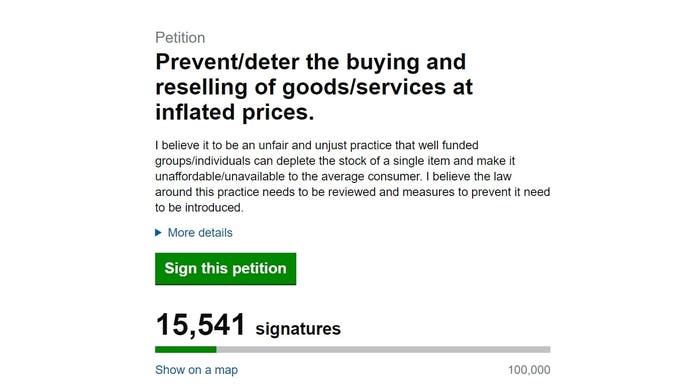UK government responds to petition calling for law change to combat console scalping
Ukie tells frustrated gamers to "stay patient".
The UK government has issued an official response to an online petition calling for a change in the law to tackle console scalping.
The petition, created by Richard Glover, received over 15,500 signatures, thus sparking a response from the Department for Business, Energy and Industrial Strategy.
Both the PlayStation 5 and Xbox Series X have been in high demand since their late 2020 release, with stock selling out soon after it goes on sale. Both consoles are available to buy on auction sites such as eBay with significant mark-ups. It's an issue we discussed during an episode of the Eurogamer Newscast, below:
The petition raises the issue of scalping groups who use bots to automatically check countless retailers, and bot scripts that allow users to buy consoles quicker than any human could.
"Both pre-orders and launch day stock were sold out instantaneously and then thousands of listings appeared on eBay at over double the RRP," the petition reads. "A reseller group claimed to have been able to secure 3500 of these."
The government introduced legislation that prevents the use of bots to purchase event tickets which are sold on at an inflated price back in 2018. That legislation currently does not include game consoles and graphics cards, however.
The Department for Business, Energy and Industrial Strategy said it's discussing the issue of "bulk purchasing of high demand items like graphics cards and games consoles through automated bots with trade associations such as Ukie".
"We understand they are currently examining further actions they can take to prevent these behaviours and are working with their retailers to improve experiences for customers purchasing their products," the Department for Business, Energy and Industrial Strategy said.
Ukie told Eurogamer it has been in talks with the government to work out how to tackle the problem of console scalpers, but for now recommended frustrated customers should "stay patient".
"We've been in constructive conversation with industry and government to determine the scale of the problem with consoles, share best practices between companies on how to tackle it and to provide advice to consumers on the matter," a spokesperson for Ukie told Eurogamer.
"For now, our top tip is to stay patient, to refuse to buy from scalpers and to buy from a trusted retailer. We understand how frustrating it is to wait for a new device, but holding out to buy a console at the recommended price from a retailer as stock shortages end will discourage scalpers, save you money and protect your consumer rights."
In December 2020, several MPs put forward a motion in UK Parliament to prohibit the resale of consoles and PC parts that are significantly overpriced.
The motion tabled by six Scottish National Party (SNP) MPs calls for the government to introduce legislation to prohibit the resale of gaming consoles and PC components at prices "greatly above Manufacturer's Recommended Retail Price" (MRRP).
The MPs suggest this could be similar in nature to existing legislation for the secondary selling of tickets, which requires sellers to be transparent and avoid misleading customers. The motion also singles out the resale of goods purchased by bots as something that could be made an illegal activity.
So far the Early Day Motion has 34 signatures (none from a Conservative MP), and there's currently no set date for its discussion in the Commons. Early Day Motions are intended to draw attention to topics of interest, meaning this is more a call for debate than a commitment to introduce legislation.
Following the creation of this Early Day Motion, MPs drafted legislation to tackle the issue.
The Gaming Hardware (Automated Purchase and Resale) Bill 2019-21 was introduced to the House of Commons by Scottish National Party MP Douglas Chapman, who hopes to tackle console scalping in a similar manner to ticket touting.
The bill was presented to Parliament on 3rd February, and is currently being prepared for publication (no date has yet been set for the second reading and debate in the Commons).
The bill is what's known as a Private Member's bill, meaning the MP introducing it is not a cabinet member, and as such it stands a lower chance of passing than government-backed Public bills. Still, Private Members' bills can help draw attention to an issue, and lead to legislation more indirectly.


